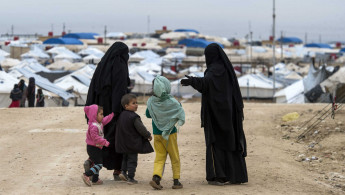EU and US clash over Trump's demand to repatriate citizens who fought with IS
Germany and France have issued strong rebuttals to Donald Trump's call for EU countries to repatriate Islamic State-group fighters, saying the request would be "extraordinarily difficult" to implement.
"The Caliphate is ready to fall. The alternative is not a good one in that we will be forced to release them. The US does not want to watch as these [IS] fighters permeate Europe, which is where they are expected to go," tweeted the US president on Saturday.
He requested the UK, France, German and other EU countries take back more than 800 fighters and "put them on trial".
"We need information, we need investigations, all that is not in place, and as long as it isn't, I think this is extraordinarily difficult to implement," German Foreign Minister Heiko Maas told ARD on Sunday.
The foreign minister affirmed the right of German nationals to repatriation, but stressed that alleged IS fighters could only come back to Germany if court proceedings could be "immediately" launched upon their return.
|
|
"For the time being we are not changing our policy," France’s Justice Minister Nicole Belloubet told France 2 on Monday. "At this stage France is not responding to [Trump’s] demands."
France's policy has so far been to deny any possibility of the repatriation of IS-linked fighters, who Foreign Minister Jean-Yves Le Drian called "enemies" of the country who should face justice in Syria or Iraq.
Trump's decision to withdraw US troops from northern Syria has recently forced both France and Germany's hands, despite clear reticence over dealing with IS-linked citizens.
French Interior Minister Christophe Castaner admitted in January the country would need to prepare for the return of French alleged IS fighters.
France has already begun to repatriate minors on a case-by-case basis.
The Syrian Democratic Forces are holding around 150 French citizens, 50 of them adults, military and diplomatic sources told Reuters.
Germany has expressed a more lenient approach, with Maas claiming that many "humanitarian cases" - women and children - have already returned to the country.
"My message is clear - if you have supported terrorist organisations abroad I will not hesitate to prevent your return," UK Home Secretary Sajid Javid told The Times, in response to the surfacing last week of Shamima Begum, a 19 year-old UK citizen who ran away from home in 2015 to join the Islamic State group.
Begum's case has ignited fresh controversy in the UK, where many have opposed her return, even to face trial, as she did not express any regrets for joining the group.
The UK estimates 200 of its citizens who allegedly joined IS are believed to be alive and present in Syria. Around 40 returnees have already been prosecuted.
Trump's demand for EU citizens to be repatriated appeared to ignore his own country’s lack of enthusiasm on the matter.
"I would tell them please forgive me for being so ignorant, and I was really young and ignorant and I was 19 when I decided to leave," US citizen Hoda Muthana told The Guardian on Sunday.
Muthana said she had not made contact with US officials since her capture. She is the only US citizen being held among an estimated 1,500 foreign women and children in the al-Hol camp in northern Syria.





 Follow the Middle East's top stories in English at The New Arab on Google News
Follow the Middle East's top stories in English at The New Arab on Google News

![Israeli forces ordered bombed Gaza's Jabalia, ordering residents to leave [Getty]](/sites/default/files/styles/image_330x185/public/2176418030.jpeg?h=a5f2f23a&itok=_YGZaP1z)
